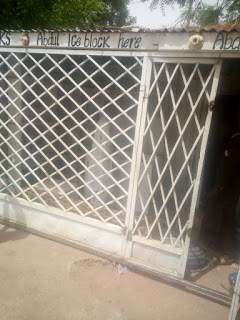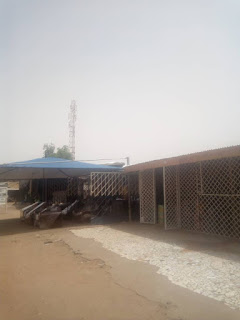By Taoheed Adegbite
On Thursday, 18th May which marked the second day of the 2018 Ramadan period, the sun was severely scorching in Usmanu Danfodiyo University, a homogeneous learning community situated in Dundaye, Sokoto state. Qomariyah, a 200 level student from the Department of Modern European Languages and Linguistics had an unwholesome day, after a hectic lecture hours coupled with the hellish sun of Sokoto in the noon hours. She decided to return to the hostel with the aim of having some rest, so as to have an hitch free fasting day. But then, the hostel room became more heckish than ever and everywhere was so hot that one could hardly breathe well.
For Qomariyah, other students of the campus and dwellers of Sokoto state at the period, generally, the weather was not friendly. The high level sunniness of the state was always between the range of 39°C and 42°C and pieces of ice blocks would be the only hope to quench the long thirsty hours of the fasting days when the sun is finally set.
“The room is too hot, I must say. When I returned from school, I was unable to sleep.There was no light, let alone being aided by a fan. To be frank, today’s fasting really wired me,” Qomariyah told THE NEWS DIGEST.
Quite unfortunate, the exorbitant amount she and her friends met ice blocks at the hostel mini-mart proved them wrong as analog thinkers; the price of the ice block was highly inflated.
“We decided to buy ice blocks, but unfortunately the price seems unaffordable. We finally resolved to buy each piece of the ice blocks at the rate of 50 Naira when our efforts to find a lesser price in the hostel mini-mart failed,” she lamented.
The same thing happened to Salihu Muhammad, a student from the Faculty of Agricultural Science. After a stressful hours of attending lectures, from one class to another under the burning sun of Sokoto. The thirst of the fasting could only be better resisted after break by consuming pieces of ice block. As it was time to have a break, after he returned from school, he felt only ice blocks could solve his problem, but, he was surprised to meet the price of the ice block at 30 Naira each (from the Students’ Union officials).
“I am aware that the ice block is sold even in town at the rate of 10 Naira per one. As you can see, I just bought this from SU at the rate of 30 Naira and it’s too costly. It would betterly be sold at the rate of 15 Naira or 20 Naira, at worst. Anyway, we have no option,” he nervously said.
The experience of Qomoriah and Salihu actually reflects the unquerulous challenges of other students of Usmanu Danfodiyo University Sokoto, as regards ice blocks, especially during the Month of Ramadan.
As at Saturday, 20th May, this reporter posed like an ice block dealer to confirm the actual price of the product from the source in the downtown of Sokoto. However, findings revealed that each ice block was sold for 10 Naira only.
“One is Ten Naira and if it’s a bag you want, it’s 200 naira,” Mallam Abdul , an ice block wholesaler explained in his Hausa accented voice.
Investigation by THE NEWS DIGEST revealed that the ice block wholesalers sell the ice block for retailers at the rate of only Ten Naira. This reporter visited four different ice block wholesalers in Dandima, Runji Sambo, Gidan Dere, Arkila respectively to confirm the prices as at the time of gathering this report.
STUDENTS’ UNION AND ITS EXPLOITATIVE WELFARISM
While other ice block dealers inside the school mini-mart would claim to have engaged in traditional business transactions with the students, the Students’ Union who neither pay for shops nor electricity still exploit students illegally, claiming to cater for students’ welfare in the Month of Ramadan.
From 17th of May, the first day of Ramadan, the ice block was sold at the rate of 25 Naira each. Arithmetically, the Students’ Union, through the office of the Sales Director earns at least Ten Naira on each ice block sold to students of Usmanu Danfodiyo University, Sokoto.
However, while responding to questions, the Students’ Union Sales Director, Abdulmajeed Ashiru (kankara) claimed that ‘they’ purchased each of the ice blocks at the rate of 20 Naira in town.
Abdulmajeed(Kankara) also claimed that, the 10 or 5 Naira on each piece of ice block was for transportation, adding that the Students’ Union gets not even a Kobo from the ice block business.
“SU has no freezer, so we bought the ice blocks from outside. There is no shop selling it at the rate of Ten Naira in town, we bought ours from areas like Runjin Sambo, Emir Yahaya and other areas (in Sokoto) for 20 Naira per ice block,” he claimed.
ANALYSIS: CATERING FOR STUDENTS’ WALFARE OR UNIONISTS’ POCKETS?
Findings by THE NEWS DIGEST revealed that, any profit oriented business has incentives as the pushing factor for venturing into any business, therefore, this could be no doubt exonerated regardless of this fasting period in traditional economic theory. The traditional economic theory gives room for the seller to make profit in as much as the consumers find no alternative to their needs.
Nonetheless, This newspaper gathered that, for the Students’ Union who claimed to have catered for the students welfare in the Month of Ramadan, the reverse is the case. Thus, students’ welfare should be the pushing factor for the Students’ Union, rather than the inflated incentive.
Ordinarily, the Students’ Union would pay no dime for the conveyance of the ice blocks from the town to the school. This is because, the union has the means of transporting the commodities. Again, the capital used for this business is no doubt own by the students without any interest as likely for others to have.
Dr Muftau Olarinde, a lecturer at the Department of Economics, Usmanu Danfodiyo University, sokoto shed more lights on the economic implications of the Students’ Union exploitative acts, while engaged by our correspondent.
“In this holy Month, when charity is what all supposed to be after, if as you said, that the Students’ Union claimed to be catering for students welfare, justice is not done.
“Firstly, the capital is not a loan of which they pay interest. Secondly, the means of transportation is through SU convener. Then, let’s assume they bought it at the rate of 20 Naira as they claimed, Five Naira added to the price is too huge considering the quantity of bags per day and as regards the analysis of welfare economic theory,” Dr Olarinde explained.
“On the side of others, it could be said as exploiting opportunity and since the aim is incentive, I mean profit. Then, traditional economic theory allows them to make profit,” he added.




